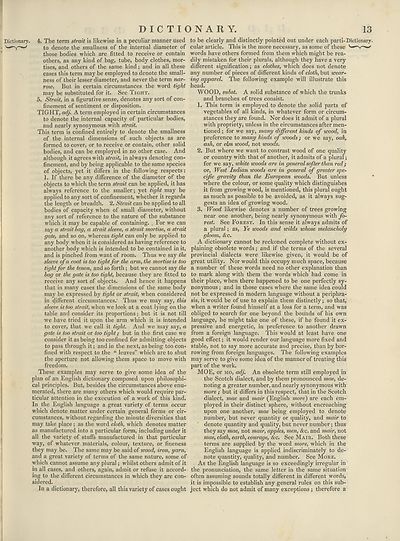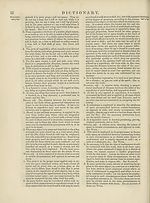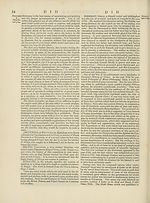Encyclopaedia Britannica > Volume 8, DIA-England
(23) Page 13
Download files
Complete book:
Individual page:
Thumbnail gallery: Grid view | List view

DICTIONARY.
Dictionary. 4. The term strait is likewise in a peculiar manner used
to denote the smallness of the internal diameter of
those bodies which are fitted to receive or contain
others, as any kind of bag, tube, body clothes, mor¬
tises, and others of the same kind; and in all these
cases this term may be employed to denote tbe small¬
ness of their lesser diameter, and never the term nar¬
row. But in certain circumstances the word tight
may be substituted for it. See Tight.
5. Strait, in a figurative sense, denotes any sort of con¬
finement of sentiment or disposition.
TIGHT, adj. A term employed in certain circumstances
to denote the internal capacity of particular bodies,
and nearly synonymous with strait.
This term is confined entirely to denote the smallness
of the internal dimensions of such objects as are
formed to cover, or to receive or contain, other solid
bodies, and can be employed in no other case. And
although it agrees with strait, in always denoting con¬
finement, and by being applicable to the same species
of objects, yet it differs in the following respects:
1. If there be any difference of the diameter of the
objects to which the term strait can be applied, it has
always reference to the smaller; yet tight may be
applied to any sort of confinement, whether it regards
the length or breadth. 2. Strait can be applied to all
bodies of capacity when of small diameter, without
any sort of reference to the nature of the substance
which it may be capable of containing. . For we can
say a strait bag, a strait sleeve, a strait mortise, a strait
gate, and so on, whereas tight can only be applied to
any body when it is considered as having reference to
another body which is intended to be contained in it,
and is pinched from want of room. Thus wre say the
sleeve ofa coat is too tight for the arm, the mortise is too
tight for the tenon, and so forth ; but we cannot say the
bag or the gate is too tight, because they are fitted to
receive any sort of objects. And hence it happens
that in many cases the dimensions of the same body
may be expressed by tight or strait, when considered
in different circumstances.' Thus we may say, this
sleeve is too strait, when we look at a coat lying on the
table and consider its proportions; but it is not till
we have tried it upon the arm which it is intended
to cover, that we call it tight. And we may say, a
gate is too strait or too tight; but in the first case we
consider it as being too confined for admitting objects
to pass through it; and in the next, as being too con¬
fined with respect to the “ leaves” which are to shut
the aperture not allowing them space to move with
freedom.
These examples may serve to give some idea of the
plan of an English dictionary composed upon philosophi¬
cal principles. But, besides the circumstances above enu¬
merated, there are many others which would require par¬
ticular attention in the execution of a work of this kind.
In the English language a great variety of terms occur
which denote matter under certain general forms or cir¬
cumstances, without regarding the minute diversities that
may take place; as the word cloth, which denotes matter
as manufactured into a particular form, including under it
all the variety of stuffs manufactured in that particular
way, of whatever materials, colour, texture, or fineness
they may be. The same may be said of wood, iron, yarn,
and a great variety of terms of the same nature, some of
which cannot assume any plural; whilst others admit of it
in all cases, and others, again, admit or refuse it accord¬
ing to the different circumstances in which they are con¬
sidered.
In a dictionary, therefore, all this variety of cases ought
13
to be clearly and distinctly pointed out under each parti-Dictionary,
cular article. This is the more necessary, as some of these v«—
words have others formed from them which might be rea¬
dily mistaken for their plurals, although they have a very
different signification; as clothes, which does not denote
any number of pieces of different kinds of cloth, but wear¬
ing apparel. The following example will illustrate this
head.
WOOD, subst. A solid substance of which the trunks
and branches of trees consist.
1. This term is employed to denote the solid parts of
vegetables of all kinds, in whatever form or circum¬
stances they are found. Nor does it admit of a plural
with propriety, unless in the circumstances after men¬
tioned ; for we say, many different kinds of wood, in
preference to many kinds of woods; or we say, oak,
ash, or elm wood, not woods.
2. But where we want to contrast wood of one quality
or country with that of another, it admits of a plural;
for we say, white woods are in general softer than red;
or, West Indian woods are in general of greater spe¬
cific gravity than the European woods. But unless
where the colour, or some quality which distinguishes
it from growing wood, is mentioned, this plural ought
as much as possible to be avoided, as it always sug¬
gests an idea of growing wood.
3. Wood likewise denotes a number of trees growing
near one another, being nearly synonymous with fo¬
rest. See Forest. In this sense it always admits of
a plural; as, Ye woods and wilds whose melancholy
gloom, &c.
A dictionary cannot be reckoned complete without ex¬
plaining obsolete words; and if the terms of the several
provincial dialects were likewise given, it would be of
great utility. Nor would this occupy much space, because
a number of these words need no other explanation than
to mark along with them the words which had come in
their place, when there happened to be one perfectly sy¬
nonymous ; and in those cases where the same idea could
not be expressed in modern language without a periphra¬
sis, it would be of use to explain them distinctly; so that,
when a writer found himself at a loss for a term, and was
obliged to search for one beyond the bounds of his own
language, he might take one of these, if he found it ex¬
pressive and energetic, in prefefence to another drawn
from a foreign language. This would at least have one
good effect; it would render our language more fixed and
stable, not to say more accurate and precise, than by bor¬
rowing from foreign languages. The following examples
may serve to give some idea of the manner of treating this
part of the work.
MOE, or mo, adj. An obsolete term still employed in
the Scotch dialect, and by them pronounced mae, de¬
noting a greater number, and nearly synonymous with
more ; but it differs in this respect, that in the Scotch
dialect, mae and mair (English more) are each em¬
ployed in their distinct sphere, without encroaching
upon one another, mae being employed to denote
number, but never quantity or quality, and mair to
denote quantity and quality, but never number; thus
they say mae, not mair, apples, men, &c. and mair, not
mae, cloth, earth, courage, &c. See Mair. Both these
terms are supplied by the word more, which in the
English language is applied indiscriminately to de¬
note quantity, quality, and number. See More.
As the English language is so exceedingly irregular in
the pronunciation, the same letter in the same situation
often assuming sounds totally different in different words,
it is impossible to establish any general rules on this sub¬
ject which do not admit of many exceptions ; therefore a
Dictionary. 4. The term strait is likewise in a peculiar manner used
to denote the smallness of the internal diameter of
those bodies which are fitted to receive or contain
others, as any kind of bag, tube, body clothes, mor¬
tises, and others of the same kind; and in all these
cases this term may be employed to denote tbe small¬
ness of their lesser diameter, and never the term nar¬
row. But in certain circumstances the word tight
may be substituted for it. See Tight.
5. Strait, in a figurative sense, denotes any sort of con¬
finement of sentiment or disposition.
TIGHT, adj. A term employed in certain circumstances
to denote the internal capacity of particular bodies,
and nearly synonymous with strait.
This term is confined entirely to denote the smallness
of the internal dimensions of such objects as are
formed to cover, or to receive or contain, other solid
bodies, and can be employed in no other case. And
although it agrees with strait, in always denoting con¬
finement, and by being applicable to the same species
of objects, yet it differs in the following respects:
1. If there be any difference of the diameter of the
objects to which the term strait can be applied, it has
always reference to the smaller; yet tight may be
applied to any sort of confinement, whether it regards
the length or breadth. 2. Strait can be applied to all
bodies of capacity when of small diameter, without
any sort of reference to the nature of the substance
which it may be capable of containing. . For we can
say a strait bag, a strait sleeve, a strait mortise, a strait
gate, and so on, whereas tight can only be applied to
any body when it is considered as having reference to
another body which is intended to be contained in it,
and is pinched from want of room. Thus wre say the
sleeve ofa coat is too tight for the arm, the mortise is too
tight for the tenon, and so forth ; but we cannot say the
bag or the gate is too tight, because they are fitted to
receive any sort of objects. And hence it happens
that in many cases the dimensions of the same body
may be expressed by tight or strait, when considered
in different circumstances.' Thus we may say, this
sleeve is too strait, when we look at a coat lying on the
table and consider its proportions; but it is not till
we have tried it upon the arm which it is intended
to cover, that we call it tight. And we may say, a
gate is too strait or too tight; but in the first case we
consider it as being too confined for admitting objects
to pass through it; and in the next, as being too con¬
fined with respect to the “ leaves” which are to shut
the aperture not allowing them space to move with
freedom.
These examples may serve to give some idea of the
plan of an English dictionary composed upon philosophi¬
cal principles. But, besides the circumstances above enu¬
merated, there are many others which would require par¬
ticular attention in the execution of a work of this kind.
In the English language a great variety of terms occur
which denote matter under certain general forms or cir¬
cumstances, without regarding the minute diversities that
may take place; as the word cloth, which denotes matter
as manufactured into a particular form, including under it
all the variety of stuffs manufactured in that particular
way, of whatever materials, colour, texture, or fineness
they may be. The same may be said of wood, iron, yarn,
and a great variety of terms of the same nature, some of
which cannot assume any plural; whilst others admit of it
in all cases, and others, again, admit or refuse it accord¬
ing to the different circumstances in which they are con¬
sidered.
In a dictionary, therefore, all this variety of cases ought
13
to be clearly and distinctly pointed out under each parti-Dictionary,
cular article. This is the more necessary, as some of these v«—
words have others formed from them which might be rea¬
dily mistaken for their plurals, although they have a very
different signification; as clothes, which does not denote
any number of pieces of different kinds of cloth, but wear¬
ing apparel. The following example will illustrate this
head.
WOOD, subst. A solid substance of which the trunks
and branches of trees consist.
1. This term is employed to denote the solid parts of
vegetables of all kinds, in whatever form or circum¬
stances they are found. Nor does it admit of a plural
with propriety, unless in the circumstances after men¬
tioned ; for we say, many different kinds of wood, in
preference to many kinds of woods; or we say, oak,
ash, or elm wood, not woods.
2. But where we want to contrast wood of one quality
or country with that of another, it admits of a plural;
for we say, white woods are in general softer than red;
or, West Indian woods are in general of greater spe¬
cific gravity than the European woods. But unless
where the colour, or some quality which distinguishes
it from growing wood, is mentioned, this plural ought
as much as possible to be avoided, as it always sug¬
gests an idea of growing wood.
3. Wood likewise denotes a number of trees growing
near one another, being nearly synonymous with fo¬
rest. See Forest. In this sense it always admits of
a plural; as, Ye woods and wilds whose melancholy
gloom, &c.
A dictionary cannot be reckoned complete without ex¬
plaining obsolete words; and if the terms of the several
provincial dialects were likewise given, it would be of
great utility. Nor would this occupy much space, because
a number of these words need no other explanation than
to mark along with them the words which had come in
their place, when there happened to be one perfectly sy¬
nonymous ; and in those cases where the same idea could
not be expressed in modern language without a periphra¬
sis, it would be of use to explain them distinctly; so that,
when a writer found himself at a loss for a term, and was
obliged to search for one beyond the bounds of his own
language, he might take one of these, if he found it ex¬
pressive and energetic, in prefefence to another drawn
from a foreign language. This would at least have one
good effect; it would render our language more fixed and
stable, not to say more accurate and precise, than by bor¬
rowing from foreign languages. The following examples
may serve to give some idea of the manner of treating this
part of the work.
MOE, or mo, adj. An obsolete term still employed in
the Scotch dialect, and by them pronounced mae, de¬
noting a greater number, and nearly synonymous with
more ; but it differs in this respect, that in the Scotch
dialect, mae and mair (English more) are each em¬
ployed in their distinct sphere, without encroaching
upon one another, mae being employed to denote
number, but never quantity or quality, and mair to
denote quantity and quality, but never number; thus
they say mae, not mair, apples, men, &c. and mair, not
mae, cloth, earth, courage, &c. See Mair. Both these
terms are supplied by the word more, which in the
English language is applied indiscriminately to de¬
note quantity, quality, and number. See More.
As the English language is so exceedingly irregular in
the pronunciation, the same letter in the same situation
often assuming sounds totally different in different words,
it is impossible to establish any general rules on this sub¬
ject which do not admit of many exceptions ; therefore a
Set display mode to:
![]() Universal Viewer |
Universal Viewer | ![]() Mirador |
Large image | Transcription
Mirador |
Large image | Transcription
Images and transcriptions on this page, including medium image downloads, may be used under the Creative Commons Attribution 4.0 International Licence unless otherwise stated. ![]()
| Encyclopaedia Britannica > Encyclopaedia Britannica > Volume 8, DIA-England > (23) Page 13 |
|---|
| Permanent URL | https://digital.nls.uk/193323304 |
|---|
| Attribution and copyright: |
|
|---|
| Description | Ten editions of 'Encyclopaedia Britannica', issued from 1768-1903, in 231 volumes. Originally issued in 100 weekly parts (3 volumes) between 1768 and 1771 by publishers: Colin Macfarquhar and Andrew Bell (Edinburgh); editor: William Smellie: engraver: Andrew Bell. Expanded editions in the 19th century featured more volumes and contributions from leading experts in their fields. Managed and published in Edinburgh up to the 9th edition (25 volumes, from 1875-1889); the 10th edition (1902-1903) re-issued the 9th edition, with 11 supplementary volumes. |
|---|---|
| Additional NLS resources: |
|

